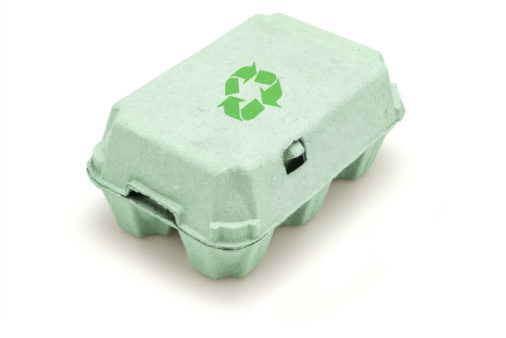The next generation of eco-packaging innovation was on display at Expo West 2011 in Anaheim. On the heels of the announcement that Coca-Cola will share its already heavily used PlantBottle packaging, derived from PET and renewable plant materials, with ketchup giant Heinz, the natural products industry had forward-thinking packaging of its own to introduce.
In a sunny café featuring benches constructed entirely out of cardboard, Seventh Generation, Burlington, VT, introduced an advance in packaging that also makes for an unusual sight: detergent bottles made out of paper. According to Peter Swaine, director of packaging development for the company, the fully recyclable and compostable content of this packaging consists of 70% cardboard and 30% old newsprint. No plastic laminations are present on the paper exterior, and a first of its kind recyclable plastic pouch houses the liquid inside.
The company partnered with eco-friendly packaging innovators Ecologic Brands, Oakland, CA, to bring the detergent to market. Consumers pry open the cardboard at a seam when the bottle is empty, easily remove the slim, #4 resin plastic pouch, and then have the option to recycle both components. “We’re waiting to see what’s going to happen with consumer acceptance,” Swaine says.
According to Julie Corbett, founder of Ecologic Brands, the product reduces plastic use compared with detergent jugs by 66%, and uses plastic derived from recycled milk bottles. “Sustainability is really a collaborative process,” says Swaine. In that spirit of collaboration, Swaine says the company is willing to share any success they have with eco-friendly packaging.
Another slant on eco-friendly consumer product packaging is the “use less stuff” mentality. Cleverly designed packages, including stand-up pouches and slim, re-sealable containers, are the result of this attitude. It was on display in the form of many new products at Expo West, and Performance Packaging, Las Vegas, NV, is one purveyor of such packaging solutions.
“Our whole approach is source reduction,” says Michael Lonergan, sales representative with Performance Packaging, whose packaging solutions run the gamut from frozen foods to cosmetics, and can reduce waste by up to 78% over traditional packages. Biodegradable plastic laminations allow the replacement of metal cans for many types of products, as well as they allow retort cooking in the bag, making for an easier consumer experience.
Fully compostable food bags have been developed by Genpak, based in Toronto and Portland, OR in the U.S., which were on display at Expo. A notable adopter of this solution is Boulder Canyon, famous for its kettle-cooked chips. The new packaging, featured in a recent article in Packaging Digest, doesn’t make offensively loud crinkling noises like other recent forays into compostable chip bags, according to Don Roach of Genpak’s specialty packing division. The bags feature a highly visible green band across the top designating them as compostable, a feature meant to draw in eco-conscious consumers.
Published in WholeFoods Magazine, May 2011 (online 3/21/11)









